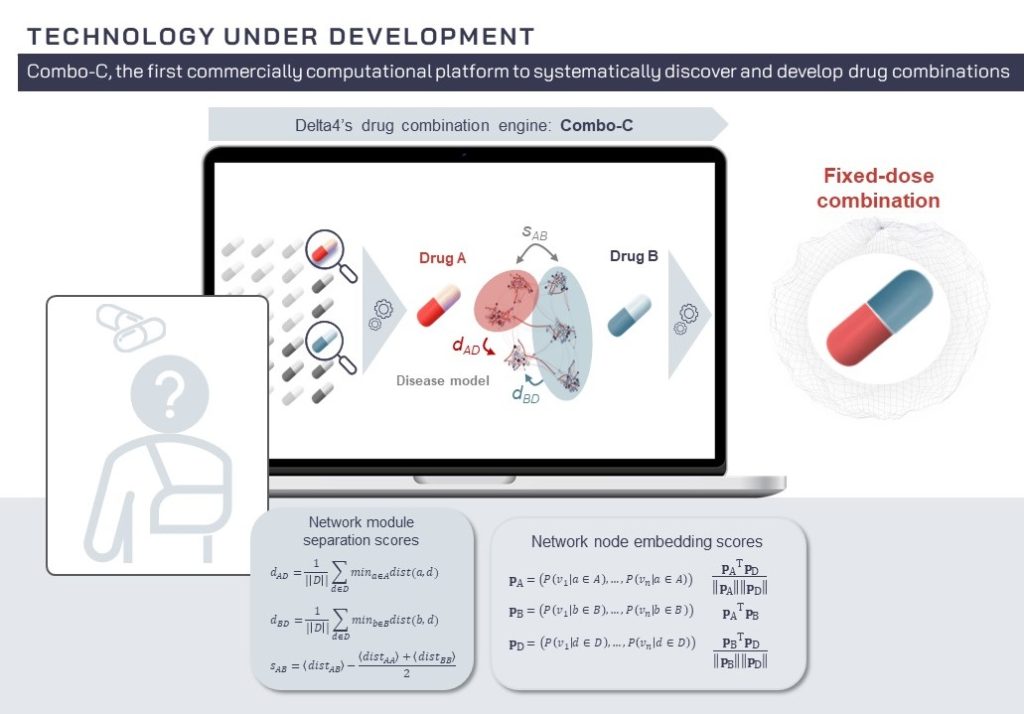The use of multiple active ingredients in medicine is a time-honored practice, with roots stretching back to Traditional Chinese Medicine (TCM) and various formulations in traditional medicine across the world based on the combination of plant and natural substances [24764197, 29799486, 36114271].
Combining multiple active ingredients, also known as drug combinations, is an increasingly important strategy in modern drug discovery. This method offers distinct advantages over single-drug therapies, particularly in treating complex diseases.
At Delta4, we leverage this approach to develop new therapies for rare diseases, using advanced data-driven techniques to accelerate drug discovery.
The Benefits of Drug Combinations
1. Enhanced Patient Compliance
One significant benefit of drug combinations is reducing patients’ “pill burden.” By combining multiple active ingredients into a single dose, fixed-dose combinations (FDCs) can improve patient compliance, which in turn enhances their overall quality of life [38500521].
2. Improved Efficacy and Resistance Prevention
Drug combinations are particularly effective in tackling diseases like cancer, where multiple pathological mechanisms are at play. By addressing these mechanisms simultaneously, combination therapies can reduce the development of drug resistance while increasing the overall potency of the treatment [28410237].
3. Synergy and Reduced Side Effects
When two or more drugs are combined, their synergistic or additive effects can often lead to reduced dosages without sacrificing therapeutic efficacy. For example, low-dose combination therapies for hypertension have proven highly effective and have been integrated into the WHO Essential Medicines List [32852644]. This approach allows for fewer side effects while maintaining or improving therapeutic outcomes.
4. Treating Multifactorial Diseases
Many diseases, particularly rare or complex ones, involve multiple pathological mechanisms, making them challenging to treat with a single drug. Drug combinations offer a way to target multiple pathways simultaneously, offering better therapeutic outcomes for multifactorial conditions such as cardiovascular diseases [35853260].
Established Use in Major Diseases
Combination therapies and FDCs are already well-established for a range of diseases, including cardiovascular conditions, HIV, malaria, tuberculosis, and various cancers. The number of studies and FDA-approved FDCs continues to rise, indicating a growing recognition of the effectiveness of this approach [26469277, 27605177].
However, many rare diseases remain without approved treatment options, leaving millions of patients worldwide without adequate solutions. An estimated 300 million people globally, including over 35 million in the European Union, are affected by rare diseases that currently lack proper treatments.

Delta4’s Approach to Drug Combinations
At Delta4, our mission is to develop new therapies for rare diseases with a high unmet medical need. With over 15,000 drugs listed in the ChEMBL database [37933841], the potential for drug combinations is vast, yet it is impossible to test every combination through traditional in vitro or in vivo methods. This is where our proprietary big-data software platform, Hyper-C, comes into play.
Hyper-C: Harnessing Big Data for Drug Discovery
Our Hyper-C platform integrates and structures vast amounts of biomedical data to aid in drug discovery. By leveraging this platform, we can efficiently search through existing data to identify promising drug combinations, focusing on repositioning already approved drugs for new therapeutic uses.
Our proof-of-concept demonstrates the power of this approach. For the rare chronic kidney disease focal segmental glomerulosclerosis (FSGS), we developed a novel drug combination of saroglitazar and myristic acid. This combination targets key dysregulated mechanisms of FSGS, with preclinical models showing efficacy and a synergistic effect. A method-of-use patent has already been filed [Patent Number: WO2022/117865A1], marking a significant milestone in our efforts.
The Future of Drug Discovery: Accelerating Polypharmacology
The paradigm of “one drug—one target” is being replaced by polypharmacology, where multiple drugs target different aspects of a disease simultaneously. By focusing on the repositioning of already available drugs with a known safety profile, Delta4 is able to substantially reduce the time it takes to bring new therapies from in silico predictions to clinical validation and full approval.
Forging a Better Tomorrow
At Delta4, we are committed to using our proven methodology to accelerate the development of new therapies for rare and under-researched diseases. Our data-driven approach, combined with the power of drug combinations, has the potential to transform the lives of patients who currently lack effective treatment options.
With our Hyper-C platform and innovative drug discovery process, we are excited to take our capabilities to the next level and provide much-needed solutions for patients around the world.


